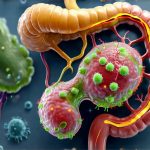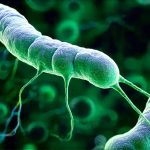The intricate ecosystem residing within our digestive tracts – collectively known as the gut microbiota – is increasingly recognized as fundamental to overall health. For decades, we’ve focused on eliminating bacteria through aggressive sanitation and antibiotic use, but this has inadvertently created a situation where many individuals are experiencing a depletion of beneficial microbes and a corresponding decline in gut health. Modern diets, characterized by highly processed foods, low fiber intake, and widespread antibiotic use in food production, play a significant role in this disruption. The consequences extend far beyond digestive discomfort; they impact immune function, mental wellbeing, and even chronic disease risk. Understanding how our dietary choices affect the delicate balance of the gut is crucial for taking proactive steps towards restoring and maintaining optimal health.
This isn’t about demonizing specific foods so much as recognizing a systemic shift in how we eat that has inadvertently starved our gut microbiome. Our ancestors consumed diets rich in diverse plant fibers, fermented foods, and minimal processed ingredients—a natural prebiotic and probiotic feast for their gut bacteria. Today’s standard Western diet often lacks these essential components, leading to a microbial imbalance known as dysbiosis. This imbalance isn’t merely an absence of good bacteria; it’s frequently accompanied by an overgrowth of potentially harmful microbes, further exacerbating the problem. Re-establishing a healthy gut microbiome requires mindful dietary adjustments and a conscious effort to incorporate prebiotic and probiotic rich foods into our daily lives. If you are struggling with this, consider how to reset your gut after periods of overindulgence.
The Erosion of Prebiotics in Modern Diets
Prebiotics are essentially food for your gut bacteria—non-digestible fibers that selectively stimulate the growth and activity of beneficial microbes. They’re not digested by our bodies, allowing them to reach the colon where they nourish the good bacteria. Historically, humans consumed a wide variety of prebiotic foods naturally present in uncultivated plants and roots. However, modern agricultural practices and food processing methods have dramatically reduced their presence in our diets.
- Refined grains replace whole grains: This removes the bran and germ, which are rich sources of prebiotics like fructans and arabinoxylans.
- Peeling fruits and vegetables: Many beneficial fibers reside in the skin, so peeling removes a significant portion of prebiotic content.
- Processing eliminates fiber: Highly processed foods often have fiber removed to improve texture and shelf life, resulting in nutrient-poor options that offer little to no benefit for gut health.
- Limited plant diversity: We tend to rely on a smaller range of crops than our ancestors did, reducing the variety of prebiotics we consume.
This consistent lack of prebiotic nourishment leads to a weakened microbial ecosystem. Beneficial bacteria starve and their populations dwindle, creating space for less desirable microbes to flourish. The consequences are far-reaching—reduced production of short-chain fatty acids (SCFAs) – vital metabolites that nourish colon cells, modulate inflammation, and support overall health – impaired immune function, and increased susceptibility to digestive issues. A prebiotic-deprived gut is a vulnerable gut. Understanding gut inflammation can help you understand the consequences of this imbalance.
The shift towards convenience foods has further exacerbated the problem. Fast food, pre-packaged meals, and sugary snacks are typically devoid of significant prebiotic fiber. Even seemingly healthy options like white rice or refined oatmeals offer minimal benefit compared to their whole-grain counterparts. Restoring prebiotic intake requires a conscious effort to incorporate more diverse plant-based foods into our diets – things like onions, garlic, leeks, asparagus, bananas (slightly green), and oats.
The Impact of Antibiotics & Food Production
The pervasive use of antibiotics isn’t limited to human medicine; it’s also widespread in animal agriculture. Animals raised for food are routinely given antibiotics, even when not sick, to promote growth and prevent disease. This practice contributes to the development of antibiotic-resistant bacteria and disrupts the gut microbiome of both animals and humans who consume their products. When we ingest meat or dairy from animals treated with antibiotics, we’re essentially exposing ourselves to low doses of these drugs, which can further decimate our own gut flora.
Furthermore, many conventional food processing techniques involve sanitization methods that inadvertently kill off beneficial bacteria. Pasteurization of milk and fermentation processes designed for consistency often prioritize eliminating all microbes—both good and bad—rather than fostering a diverse microbial community. This creates a sterile environment that hinders the development of robust gut health. It’s important to note that this isn’t necessarily advocating against pasteurization; rather, it highlights how these practices contribute to a less microbe-rich food supply. The effects of antibiotics can be long lasting and difficult to overcome.
The impact extends beyond direct antibiotic exposure. Even seemingly innocuous ingredients like emulsifiers and artificial sweeteners found in processed foods can disrupt the gut microbiome by altering its composition and function. These additives may create an environment that favors harmful bacteria while hindering the growth of beneficial ones, contributing to dysbiosis and inflammation. Our modern food system inadvertently undermines the very microbial ecosystems it relies on. If you notice persistent nausea after antibiotic use, consider gut acidity.
Rebuilding Gut Health: Dietary Strategies
Re-establishing a healthy gut microbiome requires a multifaceted approach focused on nourishing existing beneficial bacteria and promoting the growth of new ones. This begins with dietary changes that prioritize prebiotic-rich foods and minimize processed ingredients. Incorporating fermented foods like yogurt (with live cultures), kefir, sauerkraut, kimchi, and kombucha can introduce beneficial probiotics directly into your digestive system.
- Increase fiber intake gradually: Rapidly increasing fiber consumption can cause bloating and discomfort, so it’s best to do it incrementally.
- Focus on diversity: Aim for a wide range of plant-based foods—different colors, textures, and varieties – to provide diverse prebiotics for different bacterial strains.
- Minimize processed foods: Reduce your intake of refined sugars, artificial sweeteners, emulsifiers, and other additives that can disrupt the gut microbiome.
Beyond diet, lifestyle factors also play a role in gut health. Chronic stress, lack of sleep, and limited physical activity can all negatively impact the microbiome. Prioritizing stress management techniques like meditation or yoga, ensuring adequate sleep, and engaging in regular exercise are essential for supporting a healthy gut ecosystem. The key isn’t about achieving perfect health overnight but adopting sustainable lifestyle habits that foster long-term microbial balance. After infections, focus on gut resilience.
The Role of Polyphenols & Phytonutrients
Polyphenols and phytonutrients – naturally occurring compounds found in plants – aren’t technically prebiotics, but they play a vital role in supporting gut health. They act as modulators for the microbiome, influencing bacterial composition and activity. Foods rich in polyphenols include berries, dark chocolate (in moderation), green tea, red wine (also in moderation), and various spices like turmeric and cinnamon. These compounds aren’t easily digested by our bodies, meaning they reach the colon intact where they can interact with gut bacteria.
- Polyphenols can selectively promote the growth of beneficial bacteria while inhibiting the growth of harmful ones.
- They also possess antioxidant properties that help reduce inflammation in the gut and protect against oxidative stress.
- Phytonutrients enhance the diversity of the gut microbiome, leading to a more resilient and functional ecosystem.
The synergistic relationship between polyphenols, phytonutrients, and gut bacteria is fascinating. Bacteria metabolize these compounds into beneficial metabolites that further support gut health and overall wellbeing. For example, some bacteria convert polyphenols into urolithins, which have anti-inflammatory properties and can protect against age-related cognitive decline. Maximizing your intake of plant-based foods not only provides prebiotics but also unlocks a wealth of other compounds that contribute to microbial balance.
The challenge lies in consistently incorporating these nutrient-rich foods into our daily diets, given the prevalence of highly processed alternatives. However, small changes—adding berries to breakfast, sprinkling cinnamon on oatmeal, or swapping sugary drinks for green tea – can make a significant difference over time. Prioritizing whole, unprocessed foods is an investment in your gut health and overall wellbeing, fostering a thriving microbial ecosystem that supports optimal function and resilience. Also consider how meal texture impacts your digestion.


















